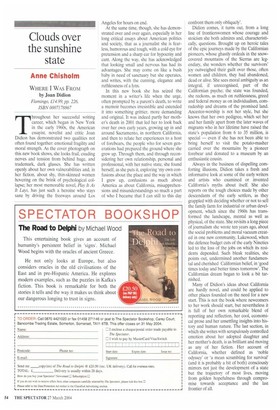Clouds over the sunshine state
Anne Chisholm
WHERE I WAS FROM by Joan Didion Flamingo, £14.99, pp. 226, ISBN 0007178867 Throughout her successful writing career, which began in New York in the early 1960s, the American essayist, novelist and critic Joan Didion has demonstrated two qualities not often found together: emotional fragility and moral strength. As the cover photograph on this new book shows, she looks frail, exuding nerves and tension from behind huge, and trademark, dark glasses. She has written openly about her own vulnerabilities and, in her fiction, about shy, thin-skinned women hovering on the brink of psychological collapse; her most memorable novel, Play It As It Lays, has just such a heroine who stays sane by driving the freeways around Los
Angeles for hours on end.
At the same time, though, she has demonstrated over and over again, especially in her long critical essays about American politics and society, that as a journalist she is fearless, humorous and tough, with a cold eye for pretension and a sharp ear for hypocrisy and cant. Along the way, she has acknowledged that looking small and nervous has had its advantages. She may come on like a bush baby in need of sanctuary but she operates, and writes, with the cunning, elegance and ruthlessness of a lynx.
In this new book she has seized the moment in a writer's life when the urge, often prompted by a parent's death, to write a memoir becomes irresistible and extended it into something grittier, more demanding and original. It was indeed partly her mother's death in 2001 that led her to look back over her own early years, growing up in and around Sacramento, in northern California, and then to relate her experiences to a host of forebears, the people who for seven generations had prepared the ground where she grew up. Through them, and through reconsidering her own relationship, personal and professional, with her native state, she found herself, as she puts it, exploring 'my own confusions about the place and the way in which I grew up, confusions as much about America as about California, misapprehensions and misunderstandings so much a part of who I became that I can still to this day confront them only obliquely'.
Didion comes, it turns out, from a long line of frontierswomen whose courage and stoicism she both admires and, characteristically, questions. Brought up on heroic tales of the epic journeys made by the Californian pioneers, whose ghastly ordeals in the snowcovered mountains of the Sierras are legendary, she wonders whether the survivors' joy outweighed their guilt over those, often women and children, they had abandoned, dead or alive. She sees moral ambiguity as an integral, if unrecognised, part of the Californian psyche; the state was founded, she reckons, as much on ruthlessness, greed and federal money as on individualism, comradeship and dreams of the promised land. Ancestor-worship is not her style, but she knows that her own pedigree, which set her and her family apart from the later waves of migrants who in her lifetime have raised the state's population from 6 to 35 million, is special — even if she has not been able to bring herself to visit the potato-masher carried over the mountains by a pioneer forebear and donated to a museum by an enthusiastic cousin.
Always in the business of dispelling comforting illusions, Didion takes a fresh and informative look at some of the early writers and artists who examined or invented California's myths about itself. She also reports on the tough choices made by other descendants of the early settlers, as they grappled with deciding whether or not to sell the family farm for industrial or urban development, which since the 1960s has transformed the landscape, mental as well as physical, of the state. She revisits a long piece of journalism she wrote ten years ago, about the social problems and moral vacuum created in one new community, Lakewood, when the defence budget cuts of the early Nineties led to the loss of the jobs on which its residents depended. Such bleak realities, she points out, undermined another fundamental and cherished Californian belief, in 'good times today and better times tomorrow'. The Californian dream began to look a bit tarnished.
Many of Didion's ideas about California are hardly novel, and could be applied to other places founded on the need for a new start. This is not the book where newcomers to her work should start, but nevertheless it is full of her own remarkable blend of reporting and reflection, her cool, economical prose and her unsettling insights into history and human nature. The last section, in which she writes with scrupulously controlled emotion about her adopted daughter and her mother's death, is as brilliant and moving as any of her fiction. Her account of California, whether defined as 'noble odyssey' or 'a mean scrambling for survival' (and it is probably a bit of both) consciously mirrors not just the development of a state but the trajectory of most lives, moving from golden hopefulness through compromise towards arreptance and the last frontier of all.


























































































 Previous page
Previous page